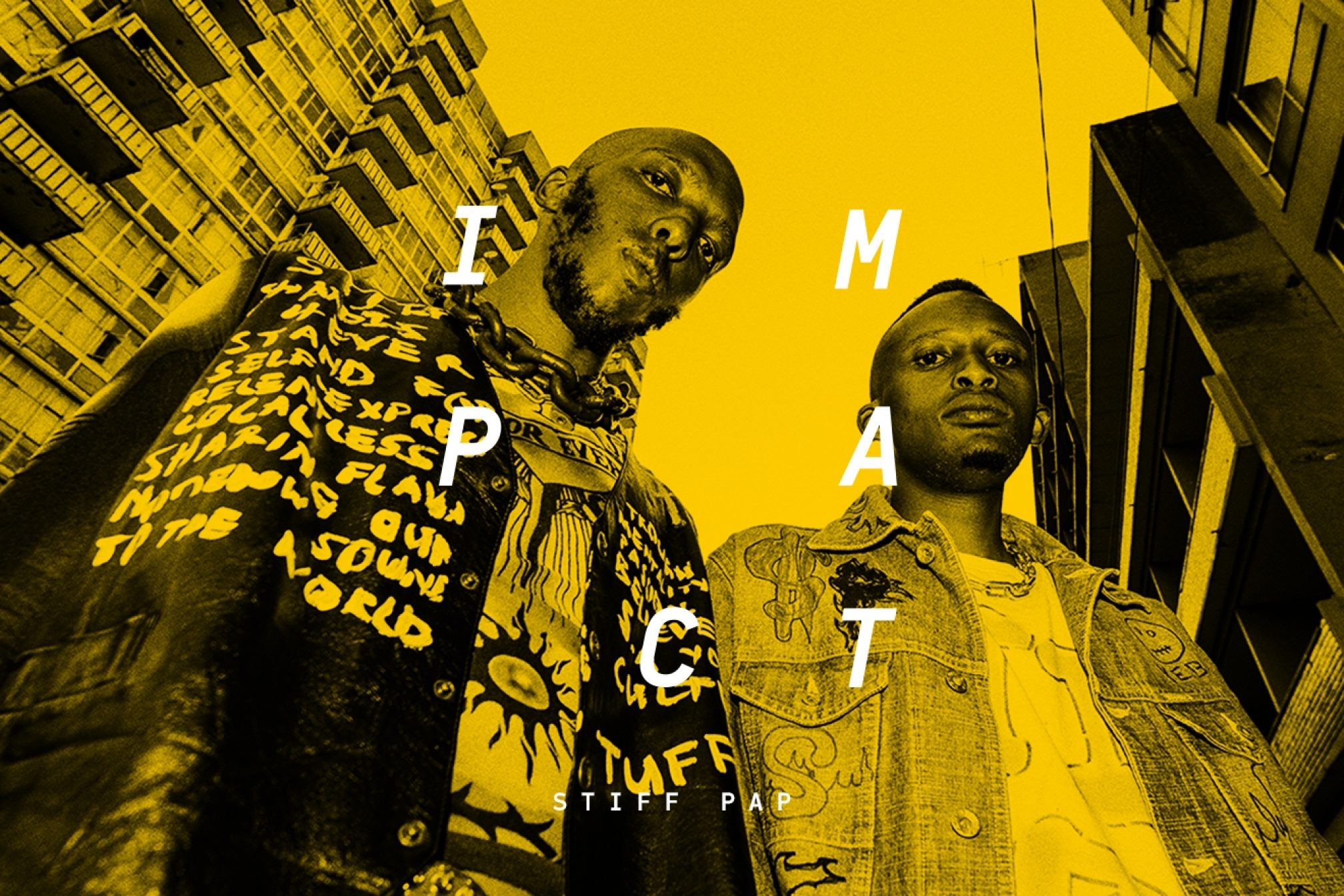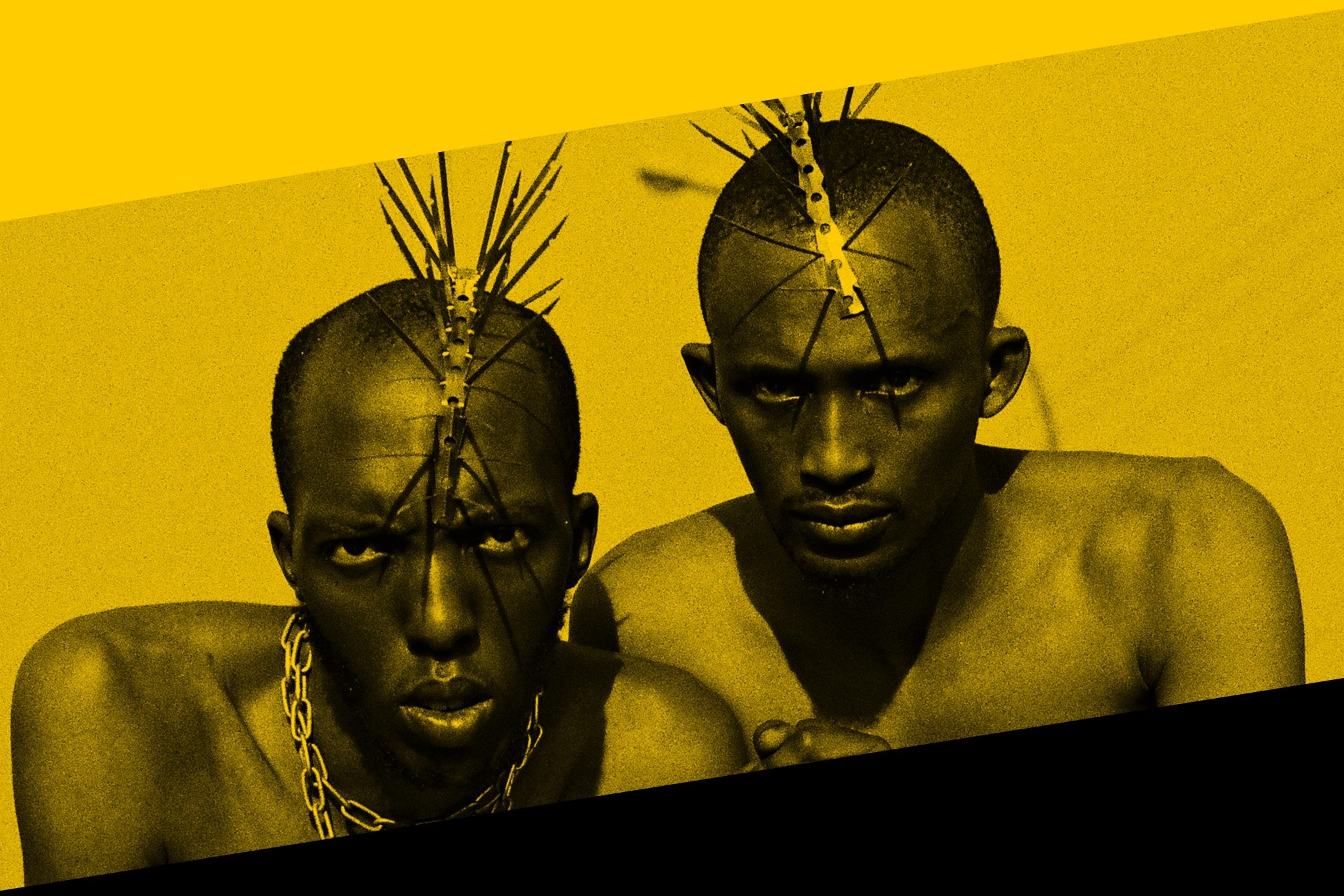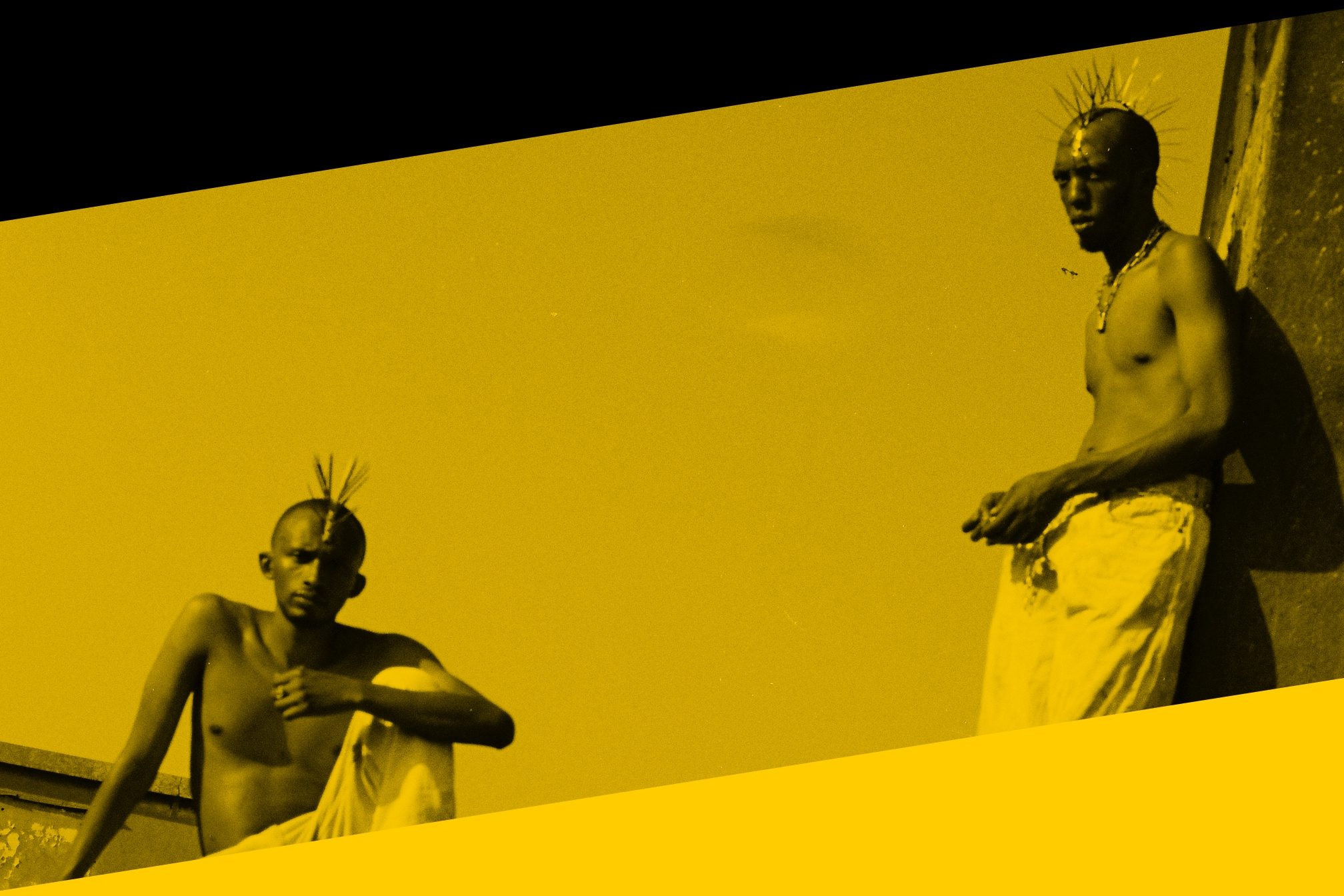 Music
Music
Stiff Pap's abrasive post-kwaito is a soundtrack for frustrated South African youth
Michael Lawson speaks to Johannesburg duo Stiff Pap, whose new EP ‘TUFF TIME$’ delivers an uncompromising sonic vision that "breaks the perception of the rainbow nation"
In the aftermath of the country's first ever fully democratic election in 1994, Archbishop Desmond Tutu described post-apartheid South Africa as a ‘rainbow nation’. It was a term intended to signify a prosperous new era - one that prioritised multiculturalism and unity after decades of racial segregation - and kwaito, the percussion-heavy house sound originating from the township of Soweto, was the soundtrack to this buoyant societal transition.
27 years on, the ideals envisioned in the rainbow nation have, for many, failed to materialise. Corruption has become a ubiquitous part of political life - only exacerbated by the pandemic - and a new generation of young South Africans fail to share the hope for the future once expressed by their parents. Johannesburg outfit Stiff Pap, made up of producer Jakinda and MC Ayema Problem, are communicating these frustrations in musical form. Trading in post-apartheid optimism for a dose of hard-hitting realism, the duo’s combination of abrasive, futuristic production and lucid, politically-charged vocals has been aptly described as ‘post-kwaito’.
Read this next: Fka Mash's blend of mbaqanga and kwaito challenges South Africa's apartheid past
Perfectly illustrating the Stiff Pap sound is ‘SASSA’, the lead single from their new EP ‘TUFF TIME$’. An acronym for South African Social Security Agency - the department responsible for distributing COVID grants - the track takes a strong stance against the failings of the government over a chaotic base of militant snare rolls and sharp synthesiser arpeggios.
Set to the backdrop of the pandemic, ‘TUFF TIME$’ offers a vivid snapshot of life as young Black men living in the South African capital — a life that is becoming increasingly difficult to navigate each day that goes by.
For their Impact mix, Stiff Pap stitch together an array of disparate sounds that influenced ‘TUFF TIME$’, from both local artists and those further afield. Check out the mix and Q&A below.

You describe your sound as ‘post-kwaito’. What do you mean by that?
Ayema Problem: Post-kwaito is an energy, it’s a vibe. I feel like a lot of people in South Africa want something that is authentic, something they can relate to, and most of the time they go back to kwaito which was authentically South African. We came after that time so we’re bringing a modern take on this.
Jakinda: Kwaito emerged from working class neighbourhoods and we’re very much influenced by its energy - that hustler, grassroots kind of energy - but we want ‘post-kwaito’ to indicate that we are a new, futuristic version of kwaito.
A: A more progressive version of what was.
Read this next: The beautiful chaos of Amapiano, South Africa's emerging house movement
Kwaito was the soundtrack to the rainbow nation during the early years of post-apartheid South Africa. Have the rainbow nation ideals failed to materialise in the years since?
J: Yeah definitely. As you say, kwaito came at a time when South Africa was transitioning from apartheid to the so-called rainbow nation that was supposed to bring so many opportunities. We were literally born into this new South Africa [Jakinda was born in 1994, Ayema 1995] and we’ve grown up to discover that the country that was promised to our parents isn’t the one we now live in.
A: Corruption is a big problem. In the post-apartheid era there have been countless instances of corruption from pretty much all parties - there’s a huge culture of it. Also people who get into positions of power and don’t use that power to further develop our nation. There are lots of frustrations.
Were these frustrations ammunition for ‘TUFF TIME$’?
A: Yeah for sure. After apartheid a lot of people were expecting changes but the poor are getting poorer and the rich are becoming the super-rich. There are a lot of people in South Africa who are very angry and very frustrated at the broken promises and the lack of opportunities.
J: In South Africa youth unemployment is ridiculous right now, close to 50%. Ayema and I both went to university but that doesn’t mean anything in this country. We’ve always been political but I feel like we’ve become a lot more political through our music recently, because each year we see things still not changing so we become a lot more frustrated. You see more and more of your friends end up in really bad positions. So that kind of frustration we’re putting into the music.
Read this next: Dwson symbolises the unified future of South African electronic music
And what is the COVID situation like in South Africa at the moment? It’s something you refer to explicitly on the track ‘SASSA’.
J: It’s terrible. We’ve seen it from different angles because we’re used to performing and throwing parties. We’ve had to stop doing that but at the same time witnessed other people throwing massive super spreader events. The hospitals are running out of beds and becoming overwhelmed as we speak. One of the lines in ‘SASSA’ is ‘our friends are still living in shacks, living in hunger’. Our government is failing us in a lot of ways. There are a lot of [COVID] grants that have been cancelled because of corruption. We receive funding from overseas institutions then that money literally disappears. So we’re releasing those frustrations through our music, which has become a lot more punk in a sense.
A: The situation is so tough that it would only make sense that we communicate that in our music. So we went with very abrasive, punky beats because that’s the energy of South African youth right now.
J: I feel like we also wanted to be in people’s faces because people outside South Africa have this perspective of it as this really sunny and happy place post-apartheid. We want this abrasive music to reflect that South Africa is actually a very scary place and to break this perception of the rainbow nation.

Can you talk me through the production process for ‘TUFF TIME$’?
J: I produce everything on my laptop and a MIDI keyboard.
A: Jakinda creates the beat then I write the raps and he adds post-production to make it level out.
And which artists did you draw inspiration from when creating this project?
J: There’s a wide variety. We made ‘TUFF TIME$’ over a period of two or three years and I’d say the people I was listening to the most during that time were Radiohead, Yves Tumor, Kanye, Okzharp & Manthe Ribane plus a lot of gqom from people like DJ Lag and Rudeboyz. Also Travis Scott I can’t lie. We’re singing a lot on this project and using auto-tune so I was definitely influenced by 'Astroworld'. The way he mixes his vocals is really cool.
A: Kanye is definitely one of our biggest influences. 'My Beautiful Dark Twisted Fantasy' is probably my favourite album of all time. Can’t forget Peggy [JPEGMAFIA], Shabazz Palaces, Toro y Moi. Locally, Lag of course, and Moonchild [Sanelly], particularly how she records her vocals - her process is amazing.
J: Basically because we listen to so many different genres and so many different artists, we really want to make music that reflects that and reflects our personalities.
Read this next: 17 women shaping African dance and electronic music
What can you tell me about the Johannesburg DIY scene that you’re a part of?
J: Stiff Pap started in Cape Town and when we moved to Jo’burg we were really inspired. Jo’burg is a very rough city, it’s an accurate representation of South Africa as a whole. There are a lot of working class people working really hard and making things out of nothing. A lot of our work is done in scrapyards where you’ll quite literally see people who are making things out of nothing. Because people don’t have a lot of resources they’re inspired to make amazing things out of very little.
A: Yeah the DIY energy of the city is amazing. Cape Town is very chill and very nice so when you come to Jo’burg it’s a culture shock because every second person you meet is a hustler. The environment encourages you to become a hustler and forces you to stand your ground and push whatever vision or dream that you’re pushing. It’s hard and rough but it’s also kinda nice if you want to be something.
It feels like South African dance music is taking over the world at the moment. Do you notice that at local level?
J: Yeah definitely. I think that’s something we actually want to disrupt in a way. We want to challenge people’s perceptions of what South African music is because we’ve noticed this lens that’s been put on us from a global standpoint. We want to show that there’s more to South African music than what you think.
‘TUFF TIME$’ is out now on Cotch International, get it here
Michael Lawson is a freelance writer, check out his Clippings
Tracklist:
1. Toro y Moi – Windows
2. Kelela - Better
3. Tame Impala - Nangs
4. Yves Tumor – Economy of Freedom
5. Menzi – Impazamo
6. James Blake – Voyeur
7. Tyler, The Creator – New Magic Wand
8. Kanye West – Hold My Liquor
9. Fever Ray – Mustn’t Hurry
10. Danny Brown – Change Up
11. Vegyn – Nauseous ft. JPEGMAFIA
12. Off The Meds – Karlaplan
12. Blood Orange – Best to You
13. Okzharp & Manthe Ribane – Maybe This
14. Rudeboyz – Mitsubishi Song
15. Stiff Pap – I See You
16. M’du – Mazolo
17. Fever Trails – Fat Eyes
18. Stiff Pap – Caster Semenya


